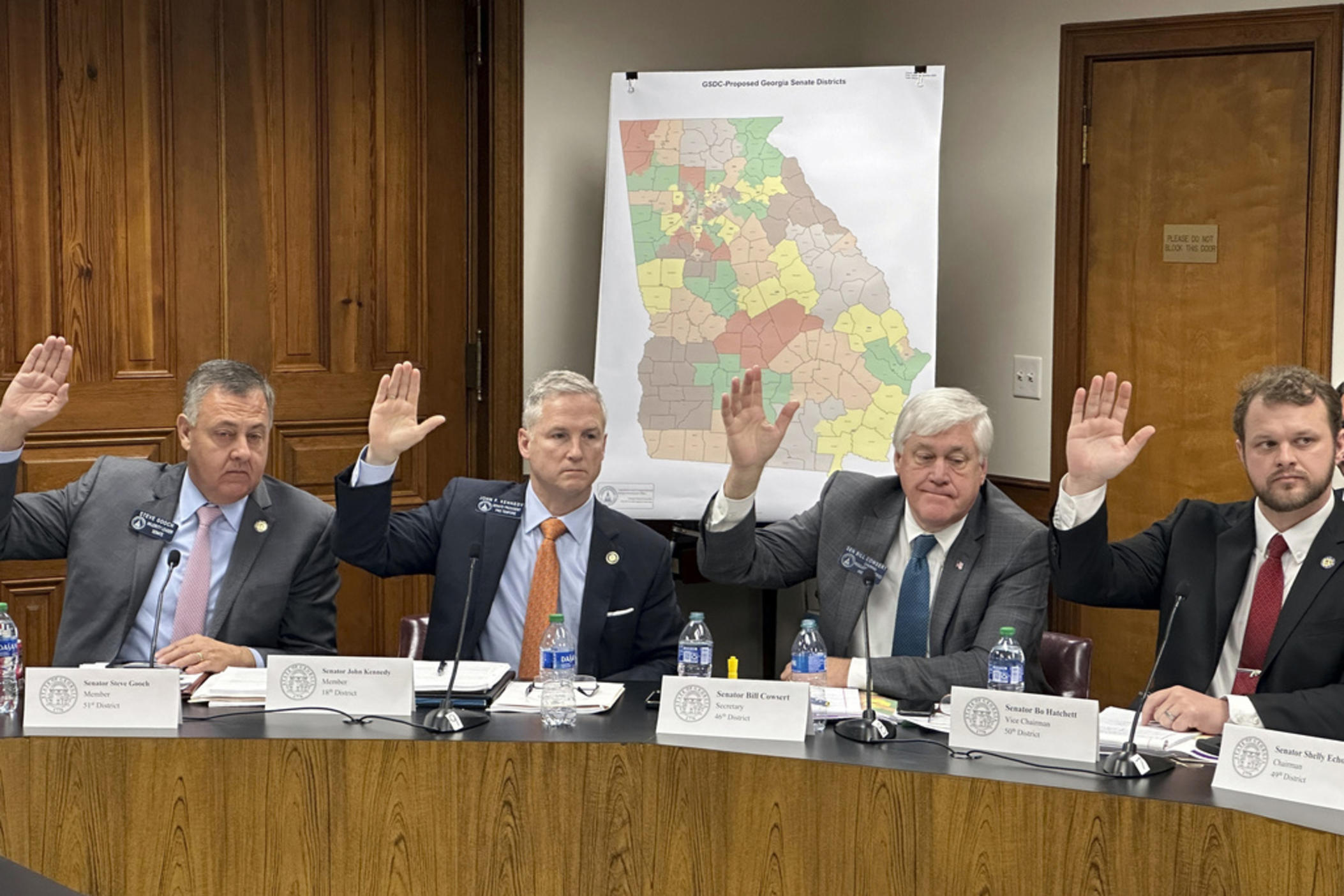Section Branding
Header Content
Republicans again target Democrat Lucy McBath in Georgia congressional map that keeps 9-5 GOP edge
Primary Content
Georgia Republicans on Friday proposed to redraw the state's congressional districts to create a new court-ordered Black majority district, maintaining the current 9-5 Republican congressional majority and again targeting Democratic U.S. Rep. Lucy McBath's district for wholesale transformation.
It's unlikely any of the proposed districts would produce competitive races between Republicans and Democrats. That's also true of Georgia's current map.
If it passes, the map could set up a court fight over whether the federal Voting Rights Act protects McBath's current district from being wiped out. She currently represents Atlanta suburbs including southern Gwinnett County and northern Fulton County. No ethnic group has a majority in the district, but Black, Asian and Hispanic voters collectively favor Democrats.
That district would be carved up between two Democratic and two Republican incumbents. Lawmakers would instead create a new majority-Black 6th District in Cobb, Douglas, Fulton and Fayette counties.
Lawmakers were called into special session after U.S. District Judge Steve Jones ruled in October that Georgia’s congressional, state Senate and state House maps violate federal law by diluting Black voting power. Jones mandated Black majorities in one additional congressional district, two additional state Senate districts and five additional state House districts. Jones instructed lawmakers to create the new congressional district on metro Atlanta's western side.
“This map meets the promise we made when this process began — it fully complies with the judge’s order, while also following Georgia’s traditional redistricting principles," Republican House Speaker Jon Burns of Newington said in a statement.
It's the second time in two years that Republicans have targeted McBath, a gun control activist. McBath, who is Black, initially won election in a majority-white district in Atlanta's northern suburbs. Georgia Republicans in 2021 took that district, once represented by Republican House Speaker Newt Gingrich, and drew it into much more Republican territory. At the same time, they made another district more Democratic. McBath jumped into that district and beat Democratic incumbent Carolyn Bordeaux in a 2022 primary.
It's unclear if McBath would try to jump districts again. Voter registration records show McBath still lives in Cobb County, where she initially won election. U.S. House members aren't legally required to live in their districts, unlike Georgia's state lawmakers.
“Georgia Republicans have yet again attempted to subvert voters by changing the rules. We will look to the ruling from Judge Jones in the coming weeks before announcing further plans," McBath campaign manager Jake Orvis said in a statement. "Regardless, Congresswoman McBath refuses to let an extremist few in the state legislature determine when her time serving Georgians in Congress is done.”
Jones wrote in his order that Georgia can’t fix its problems “by eliminating minority opportunity districts elsewhere.” Senate Reapportionment and Redistricting Committee Chairwoman Shelly Echols, a Gainesville Republican, said on the Senate floor Friday that Republicans believe only existing majority-Black districts are protected by that language.
But Kareem Crayton, who studies redistricting for the New York University's Brennan Center, said before the session that it's not that simple. He said if lawyers can show McBath's current district allows a coalition of nonwhite voters to elect a representative of their choice, the Voting Rights Act could bar it from being eliminated.
“Is it appropriate to dismantle that district in order to create another one? That’s an important question," Crayton said. "If I were the legislature, I would proceed with great caution if I were trying to make that one-for-one switch.”
The map makes big changes to some other districts. Longtime Democratic U.S. Rep. David Scott would go from representing mostly Black areas south and west of Atlanta in his 13th District to representing mostly Black areas south and east of the city, including much of the Gwinnett County area now represented by McBath. Republican U.S. Rep. Rich McCormick would be drawn farther into the north Georgia mountains from suburban Atlanta. Democratic U.S. Rep. Nikema Williams' Atlanta-based district, now with a plurality of Black voters, would become majority Black, giving the state five majority-Black districts.
Changes would also be made to six other congressional districts in parts of metro Atlanta. Five districts south and east of Atlanta would remain untouched.
The congressional map follows the same pattern as proposed legislative maps. Republicans have drawn additional majority-Black districts in the Georgia House and Senate while maintaining GOP legislative majorities.
Friday, the state House voted 101-77 to approve a new House map and the Senate voted 32-23 to approve a new Senate map. Each map must now be approved by the other chamber.
Republicans said in debate Friday that their plans comply with Jones’ order. Democrats though, predict Jones will find the Republican plans are still illegal and draw his own maps. In the Senate, they say Republicans don't do enough to fix the problems Jones identified in suburbs south of Atlanta, including two districts untouched that Jones identified as illegal. In the House, Democrats argue changes are also illegal in some districts where coalitions of nonwhite voters elect Democrats.


